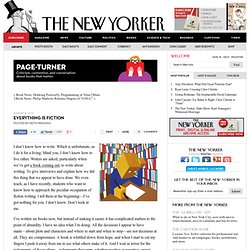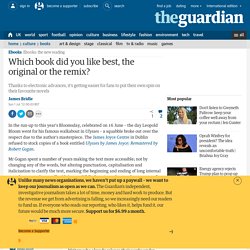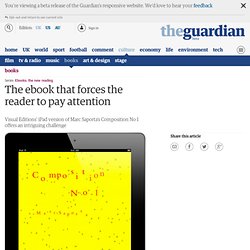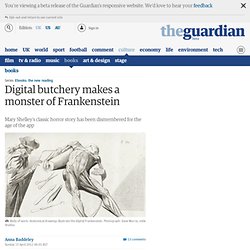

Everything in Writing and Life is Fiction. I don’t know how to write.

Which is unfortunate, as I do it for a living. Mind you, I don’t know how to live either. Writers are asked, particularly when we’ve got a book coming out, to write about writing. To give interviews and explain how we did this thing that we appear to have done. We even teach, as I have recently, students who want to know how to approach the peculiar occupation of fiction writing. I’ve written six books now, but instead of making it easier, it has complicated matters to the point of absurdity. Something, obviously, is going on. I do no research. And I mean that—everything is fiction. So I love hearing from people who have no time for fiction. Related: Read Keith Ridgway’s interview with Cressida Leyshon about his short story “Goo Book,” which appeared in the April 11, 2011, issue of the magazine. Illustration by Richard McGuire. Which book did you like best, the original or the remix? In the run-up to this year's Bloomsday, celebrated on 16 June – the day Leopold Bloom went for his famous walkabout in Ulysses – a squabble broke out over the respect due to the author's masterpiece.

The James Joyce Centre in Dublin refused to stock copies of a book entitled Ulysses by James Joyce: Remastered by Robert Gogan. Mr Gogan spent a number of years making the text more accessible; not by changing any of the words, but altering punctuation, capitalisation and italicisation to clarify the text, marking the beginning and ending of long internal monologues, and generally tidying up. While Joyce's work recently came out of copyright, opening the door to all kinds of adaptations, the Joyce Centre did not look kindly upon this interference. While abridgements and other treatments for specific audiences have been around some time, the concept of a remastered version is an intriguing one, implying a return to an original source to bring it up to date.
The ebook that forces the reader to pay attention. It's only 150 years since popular novels were regarded as mindless distractions injurious to concentration.

Now, the fear is more often voiced about electronic books. Ebooks sit at the centre of a network that seems designed to divert attention. Reading on connected smartphones and tablets, the whole internet is but a click away, forever waiting just below the surface of the page. Of course, it's an illusion that writing or reading are fundamentally hermetic experiences: they've always taken place in the wider world. Novelist William Gibson, asked if he disconnected in order to write, replied: "No, I've got Word open on top of Firefox. " One response is to cut yourself off: many users of the Kindle claim to prefer it because of its relative disconnectedness.
Composition No 1 is made up of 150 unbound pages, which may be read in any order. Digital butchery makes a monster of Frankenstein. Mary Shelley's Frankenstein is a classic whose fame is based less on literary merit than, to borrow a phrase from our Olympic organisers, its cultural legacy.

It may have spawned two entire genres – science fiction and horror – but the novel itself, while not bad for an 18-year-old, is awkward, with one of the dullest protagonists in English literature. So you can't blame writer and video-game designer Dave Morris for wanting to improve it. With the support of Profile Books and digital designers inkle, he has turned Frankenstein into an interactive app for iPhones and iPads. I hoped Frankenstein would combine the educational aspect of Faber's The Waste Land with the gothic razzmatazz of Dracula by PadWorx (a wonderful invention that adds sound effects and animation to Bram Stoker's text). First impressions were good. Morris has reworked the text into a second-person narrative but decided to keep its multiple narrators. A bigger problem is how you can't change the outcome of the story. La ocupación del lenguaje. Actualmente la derecha acapara un inmenso poder político y económico.

Pero además de imponer en toda su radicalidad el modelo neoliberal, trata de operar un cambio de mentalidades que lo normalice y con ello ejercer la hegemonía cultural mediante el control de las representaciones colectivas. Este proyecto se sustenta en una campaña sistemática de autolegitimación y descrédito de los argumentos progresistas, en coordinación con la derecha mediática mayoritaria, cuyas estrategias discursivas fundamentales son: La creación y propagación de conceptos.Propias o prestadas, las nuevas nociones trazan un mapa de la vida pública, sus actores y sus conflictos: competitividad, moderación salarial, dar confianza a los mercados, privilegios (para denominar derechos), copago. Se exponen como verdades incuestionables pero su sentido y alcance nunca se explicitan, pues parecen lograr mayor eficacia práctico-política cuanto menor es su precisión semántica.
La construcción de marcos de sentido.